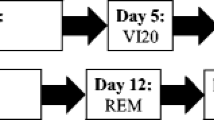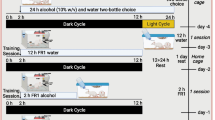Abstract
Four groups of males (n=6 each) were trained on a complex psychomotor task prior to attending five drinking sessions. They performed the task under the same dose (0.84 ml absolute alcohol/kg) on sessions 1–4. On session 5 they received a placebo. During these sessions, the first group (CR) received information and a monetary reward that was contingent on the display of nonimpaired performance under alcohol. The second group (IO) only received information about performance. The third group (NCR) received noncontingent information and reward, administered on a predetermined schedule. The fourth group (NR) received no information or reward for performance. These manipulations were predicted to influence the order of groups with respect to the rate at which tolerance developed over sessions 1–4. The findings confirmed this hypothesis, showing the rate of CR>IO>NCR>NR. The placebo session tested for the classically. conditioned compensatory response unattenuated by alcohol. The strength of the response, observed as facilitated performance, was predicted and found to relate to the rate at which tolerance had developed (i.e., CR>IO>NCR>NR). This evidence for operant and classical conditioning effects in alcohol tolerance was considered to suggest that a consideration of their joint effects may be required to understand the contribution of learning to drug tolerance.
Similar content being viewed by others
References
Beirness D, Vogel-Sprott M (1982) Does prior skill reduce alcohol-induced impairment? J Stud Alcohol 43:1149–1156
Bolles RC (1979) Learning theory. Holt Reinhart & Winston, New York
Buck L, Leonardo R, Hyde F (1981) Measuring impaired performance with the NRC “stressalyser”. Appl Ergonom 12:231–236
Chen CS (1972) A further note on studies of acquired behavioral tolerance to alcohol. Psychopharmacologia 27:265–274
Eikelboom R, Stewart J (1982) Conditioning of drug-induced physiological responses. Psychol Rev 89:507–528
Hulse S, Egeth H, Deese J (1980) The psychology of learning. McGraw-Hill, New York
Lightfoot L (1980) Behavioural tolerance to low doses of alcohol in social drinkers. Ph. D. thesis, University of Waterloo, Waterloo, Canada
Mann R, Vogel-Sprott M (1981) Control of alcohol tolerance by reinforcement in nonalcoholics. Psychopharmacology (Berlin) 75:315–320
Myrsten A, Lamble R, Frankenhauser M, Lundberg U (1979) Interaction of alcohol and reward in an achievement situation. Psychopharmacology (Berlin) 62:211–215
Rescorla R, Solomon R (1967) Two process learning theory: relationships between Pavlovian conditioning and instrumental learning. Psychol Rev 74:151–182
Schuster C, Dockens W, Woods J (1966) Behavioral variables affecting the development of amphetamine tolerance. Psychopharmacologia 9:170–172
Siegel S (1975) Evidence from rats that morphine tolerance is a learned response. J Comp Physiol Psychol 89:498–506
Siegel S (1976) Morphine analgesic tolerance: its situation specificity supports a Pavlovian conditioning model. Science 193:323–325
Siegel S (1977) Morphine tolerance acquisition as an associative process. J Exp Psychol 3:1–13
Siegel S (1982) Classical conditioning, drug tolerance and drug dependence. In: Israel Y, Glaser FB, Kalant H, Popham RE, Schmidt W, Smart RG (eds) Research advances in alcohol and drug problems (vol VII). Plenum, New York
Solomon R (1980) The opponent-process theory of acquired motivation: the cost of pleasure and the benefits of pain. Am Psychol 35:691–712
Vogel-Sprott M (1974) Defining “light” and “heavy” social drinking: research implications and hypotheses. Q J Stud Alcohol 35:1388–1392
Author information
Authors and Affiliations
Rights and permissions
About this article
Cite this article
Beirness, D., Vogel-Sprott, M. Alcohol tolerance in social drinkers: Operant and classical conditioning effects. Psychopharmacology 84, 393–397 (1984). https://doi.org/10.1007/BF00555219
Received:
Accepted:
Issue Date:
DOI: https://doi.org/10.1007/BF00555219




